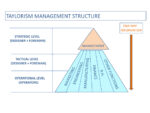What is Taylorism? Analyze its merits and demerits.
Section: B.
Sociology Paper 2023 Analysis.
Relevant for Paper-1 : Unit 6 Work and Economic Life

Question- 8 (A): What is Taylorism? Analyze its merits and demerits.. (20 Marks)
|
Introduction: Define Concept of Taylorism. Main Body: Write Principle Associated With Taylorism , Merits and Demerits. Conclusion: On the Lines of Approach Being Valuable for Contemporary Organisational Functioning. |
Introduction
- Taylorism, developed by Frederick Taylor in 20th century , is a scientific production system that divides the manufacturing process in small steps that reduce the degree of skills required to perform each activity . Its main aim was to increase productivity and efficiently within factories and production processes.
- Taylor’s approach to what he called ‘scientific management’ involved the detailed study of industrial processes in order to break them down into simple operations that could be precisely timed and organized. This scientific management came to be called as Taylorism.
Main Body
- The four basic principles of Taylor’s Scientific Management aimed towards standardising work, work methods, technology and techniques. The principles are:
-
- Development of a science for each element of work. Study of every part of the work in relation to the time spent in performing it.
- Scientific selection and training of workers before assigning them work.
- Grooming of managers to inspire workers and help them carry out the work according to the principles of scientific management.
- Training of managers and workers to sustain equal division of work and responsibility for higher productivity.
Merits of Taylorism
- Increased Efficiency: Taylorism places a high emphasis on efficiency and productivity. By breaking down tasks into smaller parts and assigning them to specialized workers, it can significantly increase the efficiency and speed of work.
- Standardization of Processes: Taylorism emphasizes the standardization of work processes, which helps in maintaining consistency in the quality of output, reducing errors, and facilitating easier training of new employees.
- Specialization and Skill Matching: Scientific management encourages the specialization of tasks, leading to increased expertise and efficiency in performing particular tasks.
- Incentive Systems: Taylor proposed the idea of a piece-rate payment system, where workers are paid based on their output, serving as a motivation for workers to increase their productivity.
- Clear Hierarchy and Authority: Taylorism promotes a clear and well-defined organizational hierarchy, reducing confusion and conflicts in the workplace.
- Systematic Approach to Problem-Solving: Taylorism encourages a scientific approach to problem-solving, leading to more informed decision-making.
- Improved Training and Development: With a focus on standardization and specialization, Taylorism advocates for systematic training programs, enhancing the skills of workers.
- Economic Benefits: Increased efficiency and productivity, along with reduced wastage, can result in economic benefits for the organization, including cost savings and improved competitiveness in the market
Demerits of Taylorism
- Dehumanisation: One of the main criticisms of Taylorism is that it can lead to the dehumanisation of workers. By breaking down tasks into smaller parts, workers can become like machines, performing the same task over and over again. This can lead to boredom and a lack of job satisfaction.
- Lack of Creativity: Taylorism discourages creativity and innovation in the workplace. Because tasks are standardised and controlled, there is little room for workers to come up with new ideas or ways of doing things. Marx argued that it causes alienation among workers.
- Worker Exploitation: Taylorism can lead to worker exploitation. Because the focus is on efficiency and productivity, workers can be pushed to work at a pace that is unsustainable or harmful to their health.
- Resistance to Change: Taylorism can lead to resistance to change. Because tasks and processes are standardised, any changes can be met with resistance from workers who are used to doing things a certain way.
- Neglect of psychological and sociological factors: Critics argued that Taylor ignored individual differences and psychological factors in his mechanistic approach. Elton Mayo’s Hawthrone study revealed that psychological and social factors were equally important as economic factors. Emphasis on economic motivation: Taylor’s focus on economic incentives was criticized for neglecting the psychological and social aspects of worker motivation.
- Overshadowing structural principles: Taylor’s principles were accused of overshadowing important structural principles such as coordination, delegation, and decentralization.
- Dichotomy between planning and execution: The separation of planning and execution was criticized for causing confusion among workers who reported to eight supervisors. Peter Drucker has characterized this as an attempt at fostering industrial harmony rather than enhancing efficiency.
- Added burden: The concept of Functional Foremanship was seen by managers as an added burden, increasing their workload and responsibilities.
Conclusion
Taylor has been criticised on various aspects of ‘Scientific Theory of Management’, it would be important to keep in mind the fact that he wrote at a time when industries worked without any laid down rules or principles. Taylor earnestly worked to improve efficiency of the organisation. He supported training of workers and imparting them skills. His approach to the study of organisation, work setting and procedure is valuable for contemporary organisational functioning.
Related Blogs…
 |
 |

To master these intricacies and fare well in the Sociology Optional Syllabus, aspiring sociologists might benefit from guidance by the Best Sociology Optional Teacher and participation in the Best Sociology Optional Coaching. These avenues provide comprehensive assistance, ensuring a solid understanding of sociology’s diverse methodologies and techniques.
META TAGS:
Taylorism, Scientific Management, Frederick Taylor, Efficiency, Standardization, Specialization, Worker Exploitation, Organizational Hierarchy, Merits and Demerits, Contemporary Organizational Functioning, Sociology Question Paper, Sociology Question Paper 2023, Sociology Question Paper CYQ, Sociology Question Paper UPSC, What is Taylorism? Analyze its merits and demerits.
Why Vikash Ranjan’s Classes for Sociology?
Proper guidance and assistance are required to learn the skill of interlinking current happenings with the conventional topics. VIKASH RANJAN SIR at TRIUMPH IAS guides students according to the Recent Trends of UPSC, making him the Best Sociology Teacher for Sociology Optional UPSC.
At Triumph IAS, the Best Sociology Optional Coaching platform, we not only provide the best study material and applied classes for Sociology for IAS but also conduct regular assignments and class tests to assess candidates’ writing skills and understanding of the subject.
Choose The Best Sociology Optional Teacher for IAS Preparation?
At the beginning of the journey for Civil Services Examination preparation, many students face a pivotal decision – selecting their optional subject. Questions such as “which optional subject is the best?” and “which optional subject is the most scoring?” frequently come to mind. Choosing the right optional subject, like choosing the best sociology optional teacher, is a subjective yet vital step that requires a thoughtful decision based on facts. A misstep in this crucial decision can indeed prove disastrous.
Ever since the exam pattern was revamped in 2013, the UPSC has eliminated the need for a second optional subject. Now, candidates have to choose only one optional subject for the UPSC Mains, which has two papers of 250 marks each. One of the compelling choices for many has been the sociology optional. However, it’s strongly advised to decide on your optional subject for mains well ahead of time to get sufficient time to complete the syllabus. After all, most students score similarly in General Studies Papers; it’s the score in the optional subject & essay that contributes significantly to the final selection.
“A sound strategy does not rely solely on the popular
Opinion of toppers or famous YouTubers cum teachers.”
It requires understanding one’s ability, interest, and the relevance of the subject, not just for the exam but also for life in general. Hence, when selecting the best sociology teacher, one must consider the usefulness of sociology optional coaching in General Studies, Essay, and Personality Test.
The choice of the optional subject should be based on objective criteria, such as the nature, scope, and size of the syllabus, uniformity and stability in the question pattern, relevance of the syllabic content in daily life in society, and the availability of study material and guidance. For example, choosing the best sociology optional coaching can ensure access to top-quality study materials and experienced teachers. Always remember, the approach of the UPSC optional subject differs from your academic studies of subjects. Therefore, before settling for sociology optional, you need to analyze the syllabus, previous years’ pattern, subject requirements (be it ideal, visionary, numerical, conceptual theoretical), and your comfort level with the subject.
This decision marks a critical point in your UPSC – CSE journey, potentially determining your success in a career in IAS/Civil Services. Therefore, it’s crucial to choose wisely, whether it’s the optional subject or the best sociology optional teacher. Always base your decision on accurate facts, and never let your emotional biases guide your choices. After all, the search for the best sociology optional coaching is about finding the perfect fit for your unique academic needs and aspirations.
Follow us :



Find More Blogs…
| Compare and contrast Karl Marx’s and Max weber’s | Karl Marx- Historical Materialism |
| Position of Women In the Modern Indian Society | Sociology: Social system and pattern variables |
KEYWORD: Taylorism, Scientific Management, Frederick Taylor, Efficiency, Standardization, Specialization, Worker Exploitation, Organizational Hierarchy, Merits and Demerits, Contemporary Organizational Functioning, What is Taylorism? Analyze its merits and demerits. Taylorism, Taylorism, Taylorism, Taylorism, Taylorism, Understanding Taylorism: Principles, Merits, and Demerits in Organizational Efficiency



